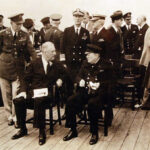
Admit it. In your most self-aggrandizing dreams you’re as charming as Sydney Bristow, as lethal as Jason Bourne, and as intuitive and intellectual as Jack Ryan. If Austin Powers was anywhere in that mix you might want to keep that to yourself. But you know that real life spies don’t really live like that. Right – you know that? A BETTER PEACE welcomes author, analyst and educator Amy Zegart to the virtual studio to set the record straight on the realities of the intelligence world in the digital age and talk about her new book Spies, Lies and Algorithms. She joins our own Gen Lester to discuss what real intelligence work looks like, what the role of AI is in the future of information collection and analysis and what intelligence priorities should look like going forward.
Intelligence is now for many decision makers in living rooms, not just the situation room.
Podcast: Download
Subscribe: Apple Podcasts | Spotify | Amazon Music | Android | Pandora | iHeartRadio | Blubrry | Podchaser | Podcast Index | TuneIn | Deezer | Youtube Music | RSS | Subscribe to A Better Peace: The War Room Podcast
Amy Zegart is the Morris Arnold and Nona Jean Cox Senior Fellow at the Hoover Institution and Professor of Political Science (by courtesy) at Stanford University. She is also a Senior Fellow at Stanford’s Freeman Spogli Institute for International Studies, Chair of Stanford’s Artificial Intelligence and International Security Steering Committee, and a contributing writer at The Atlantic. She specializes in U.S. intelligence, emerging technologies and national security, grand strategy, and global political risk management.
Genevieve Lester is the DeSerio Chair of Strategic Intelligence at the U.S. Army War College.
Photo Credit: Infographic vector created by GarryKillian – www.freepik.com





Sometimes, it depends who is heading a particular intelligence agency at any given time, just as much as who you might be dealing with. Speaking from experience in writing a book, I found the CIA most helpful, to the point of declassifying documents for my use. Another agency, however, could not seemingly find particular documents of theirs that were identified by name and number in three separate FOIA requests and a phone call (having spent years in Army intel, I knew better).
Might we attempt to place some kind of historical and/or strategic foundation under topics such as these? For example, if we consider that:
a. The U.S./the West, post-the Cold War, has been engaged in “revolutionary warfare” — that is — engaged in trying to transform the states and societies of the world (to include our own); this, so that same might be made to better interact with, better provide for and better benefit from such things as capitalism, globalization and the global economy. (Requires that certain political, economic, social and/or value “changes” be made, which, of necessity, will divest certain currently privileged population groups of a least some degree of current power, influence and control.) And that, accordingly,
b. Various state and non-state entities — thus threatened both here at home and there abroad — have been engaged in “resistance warfare.” (And/or “reversal warfare;” this, if too much unwanted change is thought to have already occurred.)
From this such perspective,
a. If I am a foreign entity seeking to intelligently recruit and/or apply “spies, lies and algorithms” — these —
b. In relation to my “resistance warfare” and/or “reversal warfare” campaigns —
c. Then, quite logically, I am going to be targeting — and seeking to work more by, with and through — my “natural allies” in these such circumstance, to wit: the more conservative/the more no-change and/or the more reversal of change elements of U.S./Western — and other — populations.
(Who, like me, are in a position to lose/have already lost power, influence and control; this, via the U.S./the West’s “transformative” grand strategy noted at my first subparagraph “a” above.)
Good interview. Highlighted lack of understanding by political leaders. Interesting points about spy entertainment actually influencing training.